Cocytius antaeus
Cocytius antaeus, the giant sphinx, is a moth of the family Sphingidae. The species was first described by Dru Drury in 1773.
| Giant sphinx | |
|---|---|
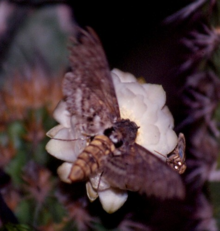 | |
| Scientific classification | |
| Kingdom: | Animalia |
| Phylum: | Arthropoda |
| Class: | Insecta |
| Order: | Lepidoptera |
| Family: | Sphingidae |
| Genus: | Cocytius |
| Species: | C. antaeus |
| Binomial name | |
| Cocytius antaeus | |
| Synonyms | |
| |
Distribution
It is found from Brazil through Central America and into the southern parts of California,[2] Texas, and Florida in the United States.
Description
The wingspan is 126–178 mm. Very rare in North America, it was once thought to be the only insect in the continent with a long enough proboscis to pollinate the similarly rare ghost orchid.
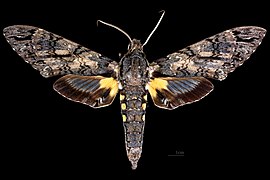 Male dorsal
Male dorsal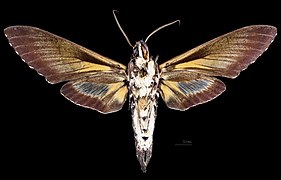 Male ventral
Male ventral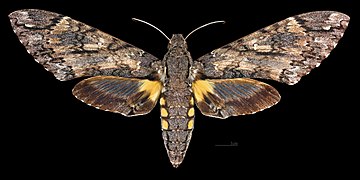 Female dorsal
Female dorsal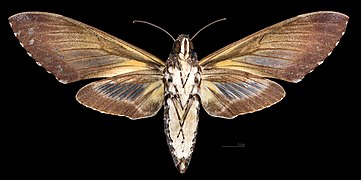 Female ventral
Female ventral
Biology
The larvae feed on Annona glabra, Annona reticulata, Annona purpurea, Annona holosericea and Rollinia membranacea.[3]
gollark: * then → also
gollark: I'd probably go for having a mixed dataset of longer chatlog chunks, and then single lines of my messages so it would know what "gollark" is.
gollark: I do not think this is permitted by the privacy policy.
gollark: The only people who actually use IRC are random open source software people, so they're very biased to that.
gollark: I have some public IRC logs for training better chatbots stored somewhere, but they're not very big.
References
- "CATE Creating a Taxonomic eScience - Sphingidae". Cate-sphingidae.org. Retrieved 2011-11-01.
- Giant Sphinx in CA
- "Silkmoths". Silkmoths.bizland.com. 2011-01-31. Archived from the original on 2016-03-04. Retrieved 2011-11-01.
External links
- Lotts, Kelly & Naberhaus, Thomas (2017). "Giant sphinx Cocytius antaeus (Drury, 1773)". Butterflies and Moths of North America. Retrieved January 1, 2019.
This article is issued from Wikipedia. The text is licensed under Creative Commons - Attribution - Sharealike. Additional terms may apply for the media files.